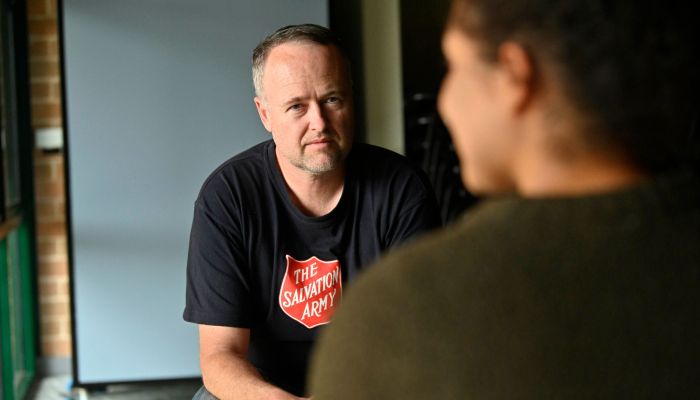Shire Salvos helps Sandy put down roots after COVID-19 nightmare
30 March 2022

Two years ago, Sandy (not her real name) was going through the most traumatic experience of her life. Her husband and father of her three children was in the grips of drug addiction and their relationship had become unhealthy. She had to get out. She had a career and savings and decided to move interstate to start a new life. Then, COVID19 hit, and her situation became worse than she could ever have imagined.
Moving thousands of kilometres from friends and family and making a new start was daunting, but what Sandy thought would be best for the family. After re-locating and settling in a rental property, Sandy allowed the kids to visit their father, who had become healthy again, and had moved to a regional location just across the border. The visit was going great, until COVID19 travel restrictions were suddenly put in place and Sandy realised with horror that she was unable to get across the border to pick her kids up.
“I go to the border with the permit to say that I could get my kids,” she said, “and I had a two-hour showdown and they turned me back and said, ‘You cannot get your children.’ I [went home] not knowing when I was going to get my kids again.”
The anxious wait for Sandy – stranded in lockdown without her children - lasted six months.
When the border re-opened she moved quickly to visit her children, leaving her rental unit fully furnished in her haste. “I thought, I can’t risk a lockdown again.” Most of her belongings were still in storage from before her first move but soon she had no way of accessing them either, due to another COVID-related border lockdown.
This time, she was stuck in Sydney with nowhere to live. But at least she was in the same state as her children. Her and her ex-husband had agreed the best thing for the kids was to finish 2021 in regional NSW where they were settled, then move back with Sandy for 2022. But finding a rental property was next to impossible and the Airbnb accommodation that she was staying in was expensive and depleting her savings.
“I had a friend in The Salvation Army, Mark Soper, so I called him to see if he could help,” she said. She had been living in temporary accommodation for months, and Sydney had just entered its 2021 COVID-19 lockdown. “I had no food in the cupboard. I had to live on oats and rice. True story. And then Mark filled my cupboards with food from the Salvos. Mark helped me with food, gave me furniture and then he offered a [Salvation Army] property in the Shire for me to rent that houses women in similar circumstances.
Sandy says it was the Salvos and her faith that got her through: “I’d be dead if I didn’t know that God loved me.”
“Life is getting better now,” she said. “I’m stabilised. I have been living unstable because of COVID for the last two years. It’s so stressful. I have spent all of my money – all of the savings I had because of not being able to work in COVID and moving around so much. I have been through the most traumatic two years of my life. My whole mental state has been weakened so much.”
After two months living in supported shared accommodation, The Salvation Army offered Sandy the opportunity to rent a transitional housing home in the Shire, where she can live with her children for two years.
“The future looks good because I know I’m in one location, I can build my network again. I have no family or friends to support me other than Mark Soper and the Salvos. That’s it. If Mark hadn’t have come to help me, I actually don’t know where I would have been.
“Do you know what happens? You lose hope. Because no one can understand your circumstances… I am an educated woman who has helped many, many people [as a mental health professional] and you don’t expect to find yourself in these circumstances. But these were completely governed by decisions out of my control.
“There are no words to describe the thankfulness that I have.”

Comments
No comments yet - be the first.